ALDS Game Three: Stanton slays the Royals
The Yankees designated hitter goes off for three hits (and a steal!) as the Royals find themselves facing postseason elimination.
Postseason baseball returned to The K for the first time in nine years on Wednesday night, but the Royals couldn’t grab any of that old October magic.
On the back of Giancarlo Stanton, the Yankees took Game Three by a score of 3-2. They now hold a 2-1 series lead.
It was just the fourth loss at The K in the Royals’ last 19 postseason games, their last loss coming in Game One of the 2015 ALDS against the Astros. They’ll need to channel the spirit of that ‘15 squad as they, too, fell behind 2-1 in that series before storming back to advance to the ALCS.
Is a comeback a tall task? Yes. Is it impossible? No.
When Seth Lugo took the mound in each of the first two innings, he was the model of efficiency. Upon reflection—and seeing how the rest of his outing went—perhaps he was efficient because he was living dangerously in the strike zone.
These were the locations of his offerings in the first inning.
The middle-middle change was a 1-1 pitch to Juan Soto. The two high fastballs in the zone were to Aaron Judge. Both players scorched balls into play. Both hit into outs.
The second inning:
The curve on the corner was the pitch that struck out Austin Wells to lead off the inning. Good, fine…great even. But the sinker in the middle of the zone was a 2-0 pitch to Giancarlo Stanton.
So I’ve called out a handful of pitches in the zone to the three Yankee sluggers. All hit into outs. But they were loud outs. How loud? Very loud.
This isn’t exactly a harbinger of struggle. But in retrospect, it’s easy to look back at the first two innings and say that the signs were there. Lugo needed 25 pitches to navigate four batters in the third inning. The only damage was a one out walk to Oswaldo Cabrera, but he just couldn’t put Alex Verdugo and Gleyber Torres away. That was the theme of the night for Lugo. Yankee batters swung and missed at just four of his 87 pitches.
Another walk, this one to Soto to lead off the fourth inning, came around to score. Lugo was close to escaping unscathed, getting Judge to fly out and sitting down Wells looking at an elevated cutter, but Stanton hammered another tasty pitch, this one a sinker that left his bat at 114.1 MPH. Yikes. It went for a double and scored Soto from first.
Watching this unfold in real time, I thought the Royals had a play on Soto at the plate. Kyle Isbel played the carom off the wall and made what looked like a strong throw to Bobby Witt Jr. at the cutoff. Witt’s throw wasn’t a good one, though. After the game as I was going through video to review some of the key plays, none of the broadcast angles had Witt’s throw. We need to discuss this. The production of the American League games on TBS has been abysmal. Plays are missed. Cameras are live where the camera operator isn’t aware of this fact. Replays are late or have to be dumped out of early because the action is rolling along. Then there’s Bob Costas in the booth who is calling soft line drive outs as base hits while carrying an extremely strong Yankee-centric vibe on all of his calls. Having worked on these productions, I understand they’re not easy to pull off. It’s truly a ballet on a high wire to have everything mesh together. These broadcasts, though, are simply embarrassing.
I will now stand down from my soapbox.
Trouble lurked again in the fifth against the bottom third of the Yankees order. Again, the issues surface with a lead-off baserunner. This time it was a single from Anthony Volpe. To compound matters, Lugo walked the next man, Oswaldo Cabrera on four pitches.
Maybe that fourth pitch could’ve been a 3-0 “automatic” strike, and it was the closest of the four offerings, but Lugo didn’t get a courtesy call.
It’s at this point, the alarm is ringing. Lugo was going to need some help to get out of this mess. Luckily, the Yankees decided to sacrifice an out to move the runners up as Alex Verdugo got down a sacrifice bunt. After watching Verdugo foul off the first bunt attempt and then almost offer at a pitch out of the zone, it was surprising he was able to get one down. Still, it was a gift to a struggling pitcher.
As the lineup flipped over a third time, Lugo walked Torres on six pitches. The four balls were nowhere near the zone.
There’s a shortlist of players I absolutely don’t want to see come to the plate with the bases loaded. Juan Soto would be on that list. The guy is the epitome of “professional hitter.” He just works an at bat. His eye is among the best in the game and he just gives absolutely nothing away. Generally. With a 3-1 count and a pitcher struggling to locate, Soto went hunting high.
That’s ball four and a run. Instead, it’s the second out and a run. Give me those options, you’ll always choose the latter.
To look at the partial line score on Lugo—five innings, two hits, two runs—and it seems fairly innocuous. Yet the rest of the stat line—the four walks and just the two strikeouts—tell the story of struggle and the lack of a putaway pitch that could’ve gotten him out of an extended battle or two. In outings like this, I suppose the writing cliche is to say it could’ve been worse and credit the pitcher for keeping it close despite possessing his command or his best stuff. There’s something to that, I suppose.
So, credit to Lugo for keeping it close through five.
While the Yankees were working over Lugo, his counterpart, Yankee starter Clarke Schmidt, was largely keeping the Royals in check through four innings. In the second, third and fourth innings, the Royals put a runner on with one out. All the Royals could muster was a Yuli Gurriel double off the left field wall.
That would change in the fifth after the Yankees had their 2-0 lead. I think my favorite rallies are of the two out variety. There’s a suddenness to them that can jar a game and a team to life. The Royals experienced such a moment in the fifth inning, down two runs.
After the first two batters were retired by Schmidt, Adam Frazier got things started with a pseudo infield single. I dropped the “pseudo” there because Yankees shortstop Anthony Volpe, who was playing shaded up the middle, had to charge in from where he would traditionally be playing and rushed his throw to first. As such, it sailed over the head of the first baseman Cabrera. Frazier’s batted ball carried with it an xBA of .080.
Luck. If you can create it, you can use it. Someone let Chisholm know.
This brought up Kyle Isbel. As I write throughout the year, I pick up on certain themes or events that seem to occur with regularity. This season, I’m aware that I’ve written plenty about Isbel and how I’m fine with him at the plate in big moments. It’s not with any kind of authority or emphasis, he just seems to come through. As the fifth inning unfolded, I thought about Isbel and how this season he has been the guy who ignites rallies. Often, he has been the one to get things started for the top of the order in the innings that turn into run-scoring bonanzas for the Royals.
The Royals lineup was set to flip for a third time. Isbel, at the bottom of the order, was facing Schmidt for the second time in the game.
These are the league averages when hitters face a starting pitcher for the first and second times in a game.
You see the modest increases in OBP and slugging and how the league goes from slightly below average to slightly above.
These are Isbel’s numbers when facing a starting pitcher for the first and second time in a game.
Isbel takes a quantum leap in production from his first time to his second against a starting pitcher. In fact, he turns into a better hitter than the league average in that second plate appearance. No wonder he’s been the ignitor behind so many rallies this summer. Get him up the second time against a starter, let him rip and then it’s the third time for Witt and the rest of the order. By the time the bullpen can spring into action, the Royals have plated two or three runs and are threatening for more.
That’s not exactly how it played out on Wednesday, but it did come close. With Frazier running on a 3-2 pitch, Isbel expanded his zone and took a cutter the opposite way.
That’s a pitcher’s pitch, but Isbel is able to hang with it and take it to right. Good piece of hitting from a guy who’s much better that second time against a starter.
After Isbel doubled to score Frazier from first, Michael Massey, seeing Schmidt for that third time, hit a sinking liner that Juan Soto laid out for in right field but couldn’t come up with. The ball rolled to the wall and Massey had an easy three bases.
The Soto dive didn’t gift the Royals their second run. Isbel would’ve scored easily on even if Soto had played the ball properly. The only way the shoddy defense would come with a penalty would be if the Royals could’ve scored Massey from third. You like their chances with Witt coming up next, but Yankee manager Aaron Boone knows what he’s doing. The Massey triple would end Schmidt’s night.
By the way, Massey remains hot. That was his seventh hit of the postseason and he’s batting .368 (7-for-19) in October.
Former closer Clay Holmes entered the game and walked Witt but was able to get Vinnie Pasquantino to fly out. The rally was over.
The Yankees would threaten in the sixth with two runners on, but relievers Angel Zerpa and John Schreiber held them at bay. Matt Quatraro has been very rote in his bullpen management in the postseason with those two being the first men out. Zerpa allowed a single to Stanton and Schreiber walked Volpe. Then Schreiber was able to get Cabrera out on a fly ball to center.
In the seventh, lefty Sam Long was handed the ball. He got the first two outs on grounders, but walked Soto on a seven-pitch battle. That brought up Judge who had gone 1-10 up to that point over the two-plus games. (Judge’s postseason struggle is a constant storyline on the broadcast that borders on the frenzy surrounding Madison Bumgarner in Royals opponent lore.) Lack of production aside, Quatraro did not want his lefty to face Judge.
We had a Brady Singer sighting!
I have to admit, I wasn’t exactly stoked to see Singer in this situation—coming into the later innings of a game with a runner on first and one of the more dangerous hitters in the game at the plate. Yet Singer was cool as can be.
I thought it was a good sequence of pitches from Singer. He started him with a sinker in the zone for a called strike then went up with his four-seamer for a swing and a miss. Ahead 0-2, Singer went with a slider down and away and a sinker just off the plate before trying to get another chase with a slider down and away. The sliders were a bit too far off the dish for Judge to bite.
But Singer got Judge to go fishing on that slider just off the edge for the third strike. Or did he?
Yeah. He didn’t swing.
Still, credit to Singer for putting the pitch in that location that had Judge flinching. I don’t think he was looking slider on 3-2 and because he wasn’t looking slider he also wasn’t looking for a pitch in that general location. I think we can say it was a good pitch from Singer and Judge got screwed on the call and both things can be true.
Judge was the only batter Singer faced. The eighth inning belonged to Kris Bubic.
After getting the first out, Bubic had to face Stanton. He started off the confrontation with a four-seamer up out of the zone followed by a changeup down. Behind in the count 2-0, Bubic went slider-slider. The first one was elevated and called a strike. The second was down and called a ball. Both probably caught the zone. For the 3-1 pitch, Bubic returned to the slider for a third consecutive time.
Watching this, I don’t believe that it’s a terrible pitch from Bubic. It’s down in a location that, given the call on the previous slider, would probably be ball four. Fine. That would be a preferable outcome to what transpired. But then I think…three consecutive sliders. That’s probably not what you want against a hitter as locked in as Stanton was on this evening.
Another thought I have while watching this is that Stanton just takes an absolute rip when he swings the bat. The guy just lets it fly. It’s impressive.
The Royals had their chance in the bottom of the inning. With one out and with newly minted Yankees closer Luke Weaver fresh out of the bullpen, Witt finally picked up his first hit of the series.
Up next, Pasquantino was first-pitch swinging and hit a soft little liner behind the bag at second that the shortstop Volpe was able to range over to grab. It looked like it could’ve gone for a hit but it was such a soft little liner, it needed just a bit more weight behind it and then the Royals would’ve really been in business.
That brought up Perez with two outs.
The question becomes: Does Witt attempt to steal?
There are two parts to this equation. The one we’re most familiar with is that Witt seemingly is in a stolen base slump. His stolen base success rate has gone from 81 percent his rookie season (30 for 37) to 77 percent (49 for 64) last year to 72 percent (31 for 43) in 2024. What’s more, the eye test backs up the statistics. He just doesn’t look comfortable getting that jump to nab a base. He’s absolutely fine flipping on the afterburners and going from first to third (or home) on a single. Witt is just not able to get that jump off a pitcher these days.
Since July, Witt has stolen nine bases in 13 attempts, a 69 percent success rate.
It’s insane to think about. With Witt’s elite speed, he should be able to take any base he wants. If he can’t get a solid read and a strong jump, that speed isn’t going to help.
The other factor to consider is the pitcher. Weaver is very good at holding runners. He has a leg kick, but it’s not super exaggerated and he moves quickly to the plate.
It also helps that his fastball is coming in hot around 97 MPH on average.
This season, in 84 innings, there were three attempted stolen bases off Weaver. Only one was successful. The season before, when he was primarily a starter, allowed a ton of baserunners because he was nowhere near as good and threw 123 innings, there were five attempted steals. Three were successful.
In my mind, the risk in this situation is extreme. You are down to your final four outs and your opponent’s best reliever is in the game. Do you want to take the chance?
Perez singled and Witt motored to third. We cannot assume that had Witt swiped second that the outcome would’ve been the same. That’s not how this game works. Look at how Weaver pitched Perez with Witt on first.
That’s an insane sequence made even more insane by the fact that Perez actually hit a single. The man swung at pitch two and at pitch three! And got a hit on pitch six! Look at where those are located. Goodness.
The next plate appearance was the key plate appearance and it belonged to Gurriel. Weaver attacked him with a couple of elevated fastballs. Gurriel swung under the second one and lofted a harmless fly to center for the final out of the inning. The threat was over.
On to some other items…
This was the fourth game this October for the Royals that was decided by one run. They won both one-run contests against the Orioles, but have now dropped their two games to the Yankees with single-run margins.
Now I remember…Playoff baseball is kind of stressful.
Royals pitchers walked nine Yankees on Wednesday, the most free passes they issued in a game all year. Only one of those walks came around to score which feels like a minor miracle.
That comes after surrendering eight walks in Game One. Royals pitchers have walked 22 Yankees batters in this series.
Yes, we are all familiar with the comments Jazz Chisholm made in the aftermath of the Royals win in Game Two. Just in case you’ve been living under a rock:
“Still feels the same that we’re going to win it. It doesn’t feel like anybody feels any different. We’re going to go out there and do our things. We still don’t feel like any team is better than us. Like you said, we had a lot of missed opportunities tonight. They just got lucky.”
My personal opinion? Whatever. It’s stupid. As in, factually stupid. Want to talk about luck? Let’s discuss how the Yankees won Game One.
But there are certain truths in Kansas City. One, the barbeque is tasty. Two, the people are nice. And three, we can boo the hell out of a New York Yankee who has aggrieved us. Mr. Chisholm, meet Mr. Canó.
This series needed a villain, especially for the games at The K.
As a team, the Yankees went 0-6 with runners in scoring position. They left 11 men on base. The Royals were 1-5 with RISP (the Massey triple). They left six on. The Royals had a chance in the second when Gurriel hit a one-out double off the wall in left. Again, I’m never expecting any kind of thump from the Royals’ newly-found first baseman, so that drive (it would’ve been a home run in 22 other ballparks) was impressive. I was thinking that if Gurriel is hitting screamers like that the Royals have to score. Alas. MJ Melendez went down swinging and Maikel Garcia grounded to first and Gurriel never advanced beyond second.
As far as replay goes, can we say fair is fair? Or is fair…foul?
For the second time in three games, replay seems to get a call wrong and where, in Game One, it led to the Yankees scoring what was the go-ahead and game-winning run, on this night in Kansas City, it meant a do-over on what would’ve been a double to put runners on second and third. Crisis averted thanks to the replay crew in New York.
This one felt a little less impactful given the timing, but still…I think it was another one of those calls that, had it been called fair, would not have been overturned. So the Royals caught a little bit of a break, I suppose.
Frazier got the start in right field, I suppose because he hit well against Yankees starter Schmidt in the past. Small sample but he entered the game 4-9 against the right-hander with a home run.
He did start the Royals’ rally in the fourth with that two-out grounder to short. The only time he was pressed into action in the field was at the end of the third when he ranged back on fly ball from Torres. The route he took was…interesting. I think we all had visions of Nori Aoki in that moment.
In addition to going 3-5 with a double, the game-winning home run and driving in two of the three runs for New York, Stanton stole a base. Seems cruel that Stanton, with his third-percentile sprint speed, can swipe a bag and Witt can’t. It was Stanton’s first stolen base attempt since August 3, 2020.
The series continues Thursday night back at The K for Game Four. It’s a rematch of Game One starters Gerrit Cole and Michael Wacha. First pitch is slated for 7:08.





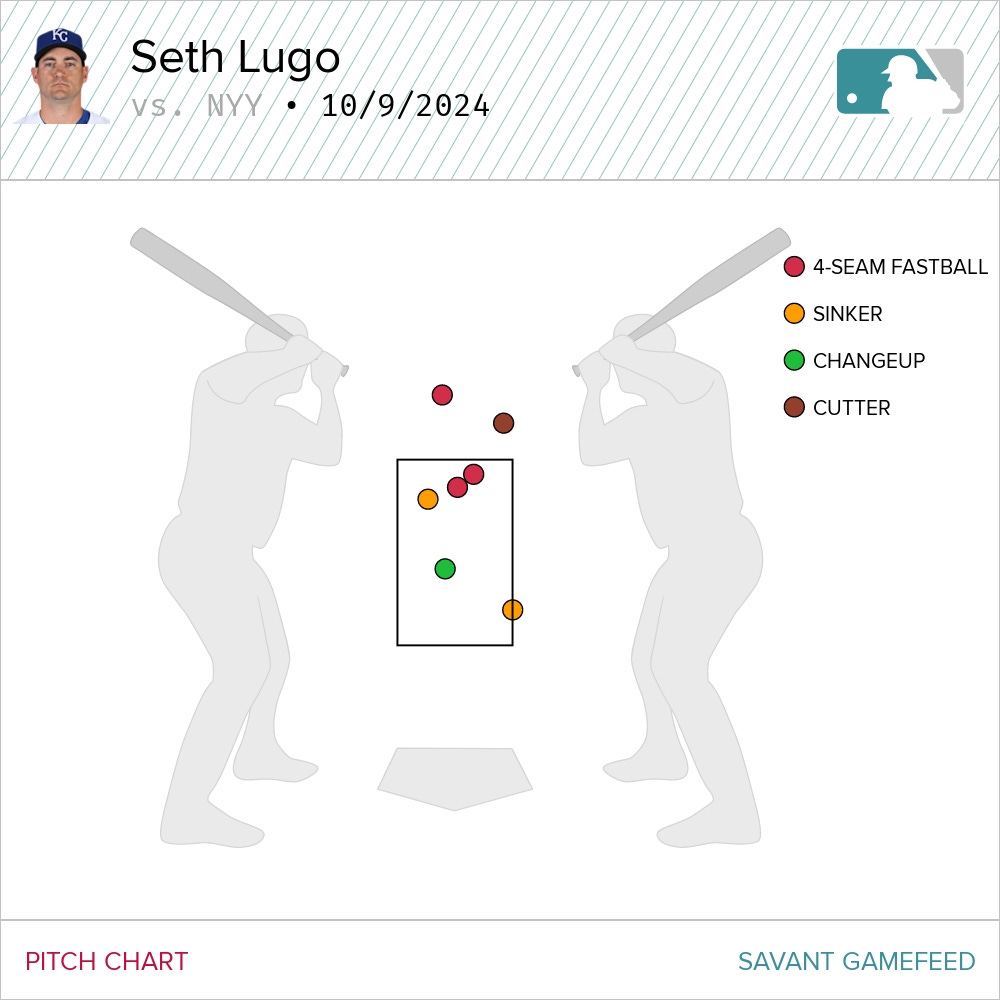
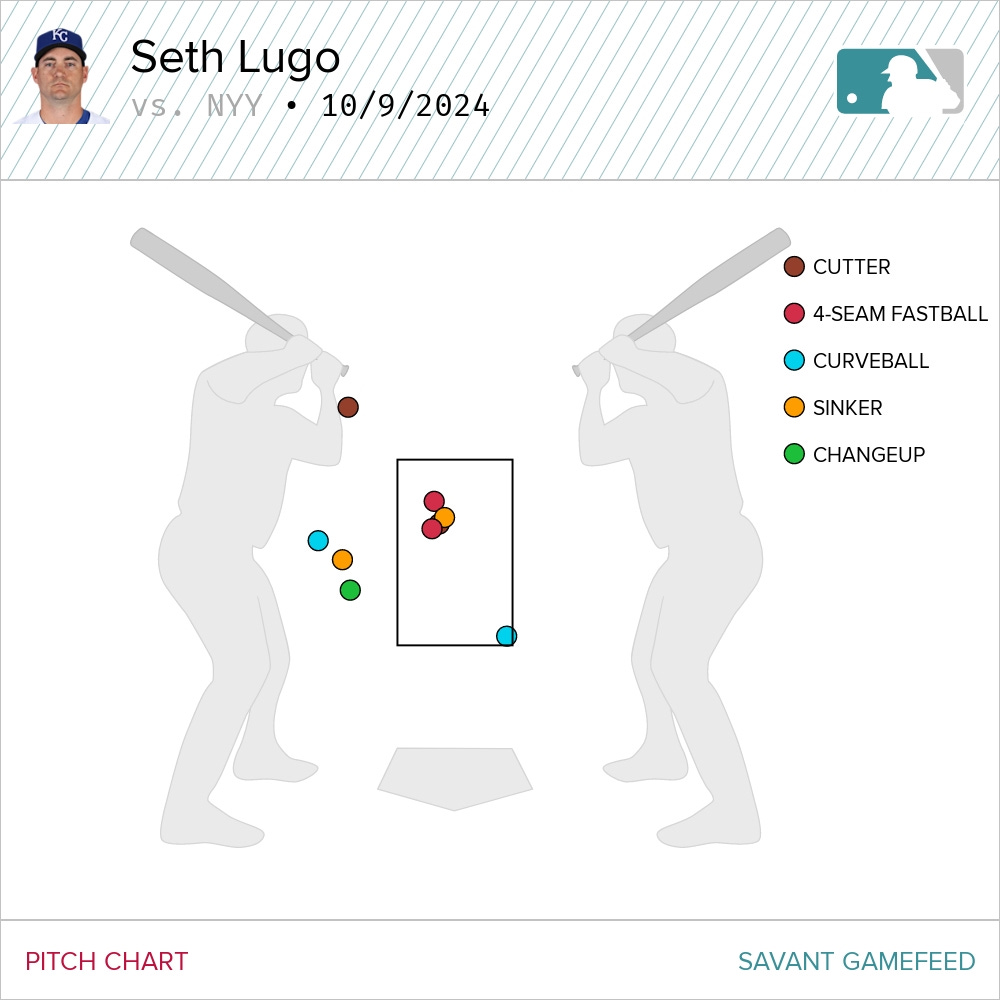

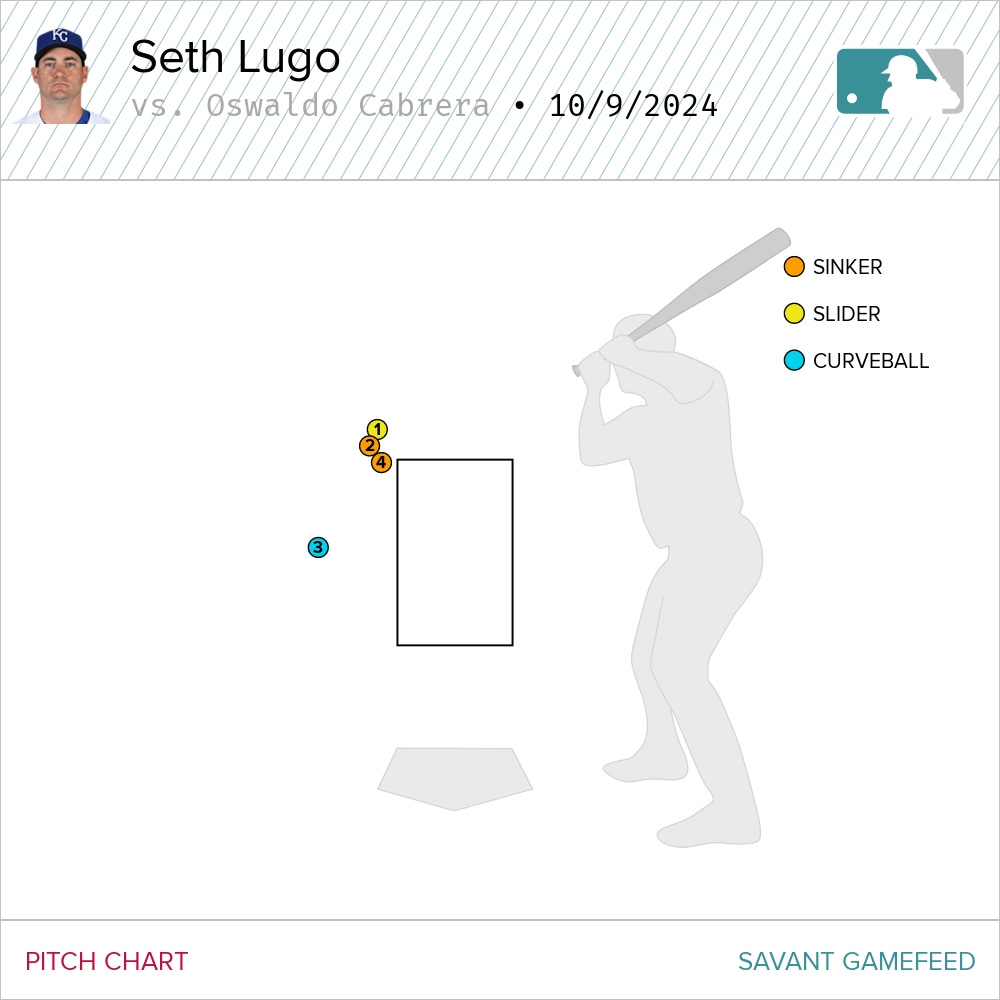
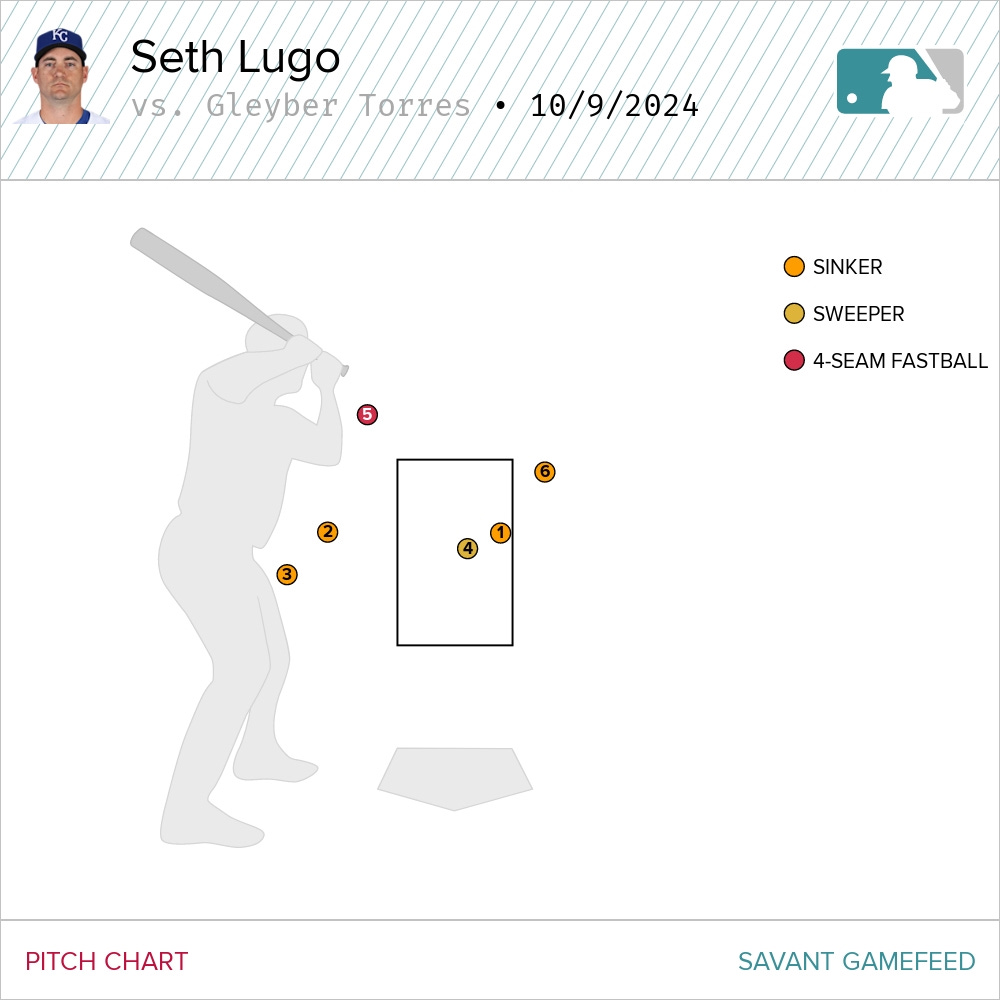
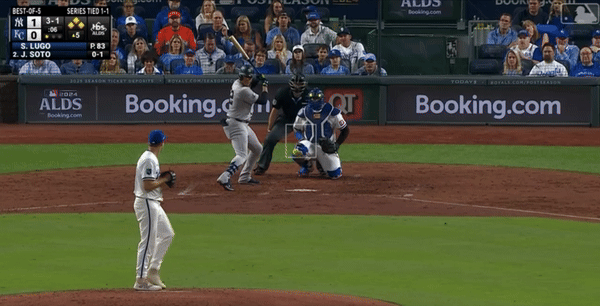



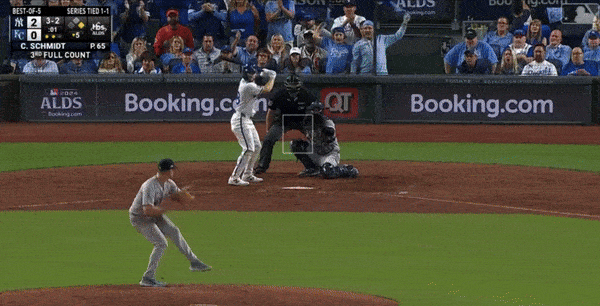
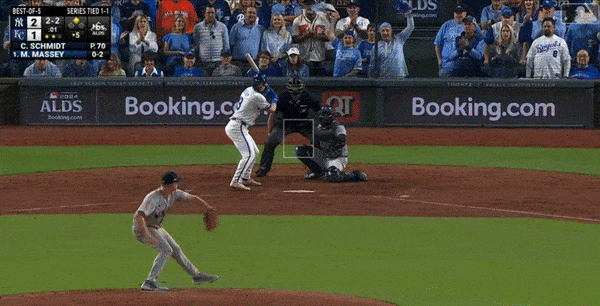

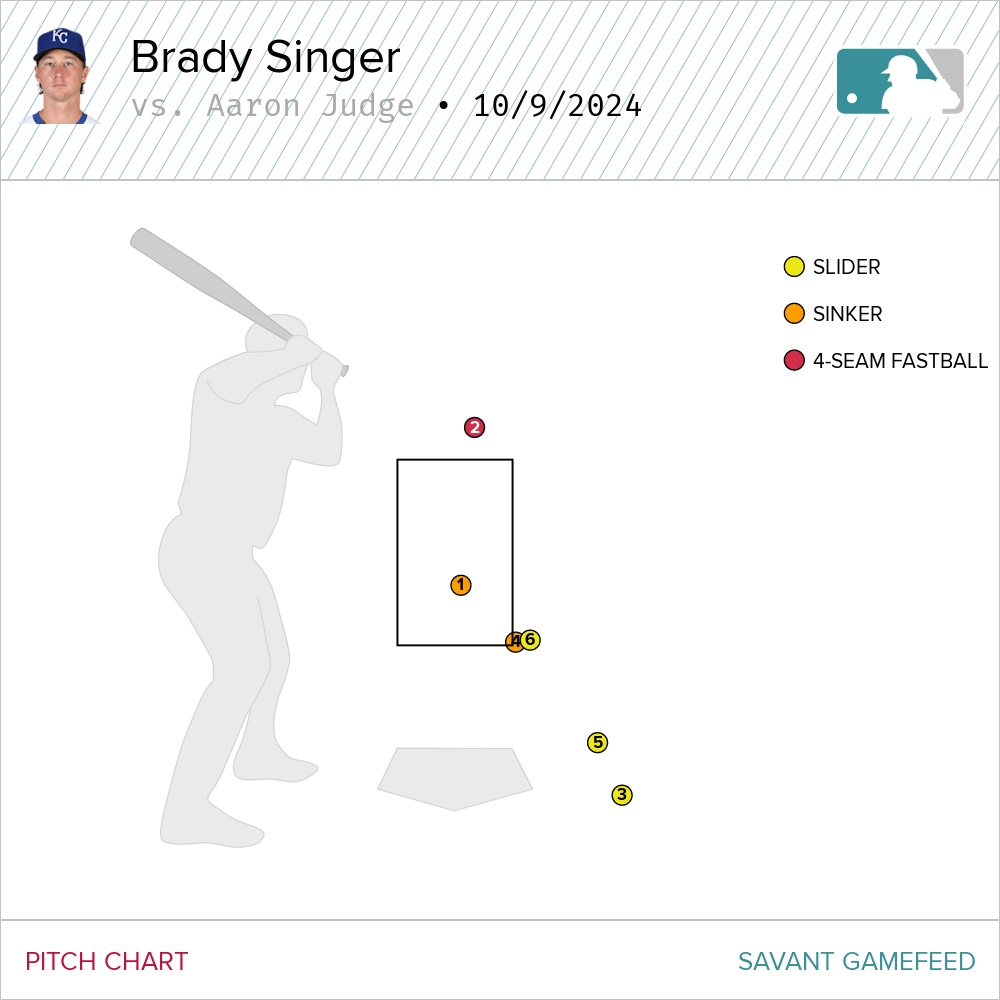
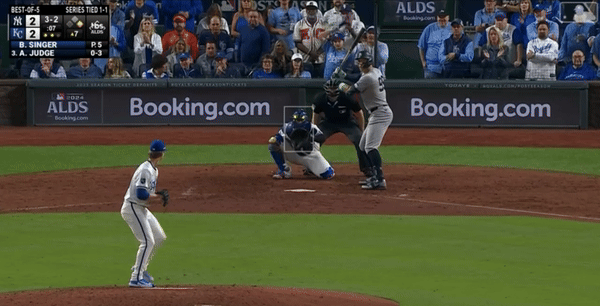


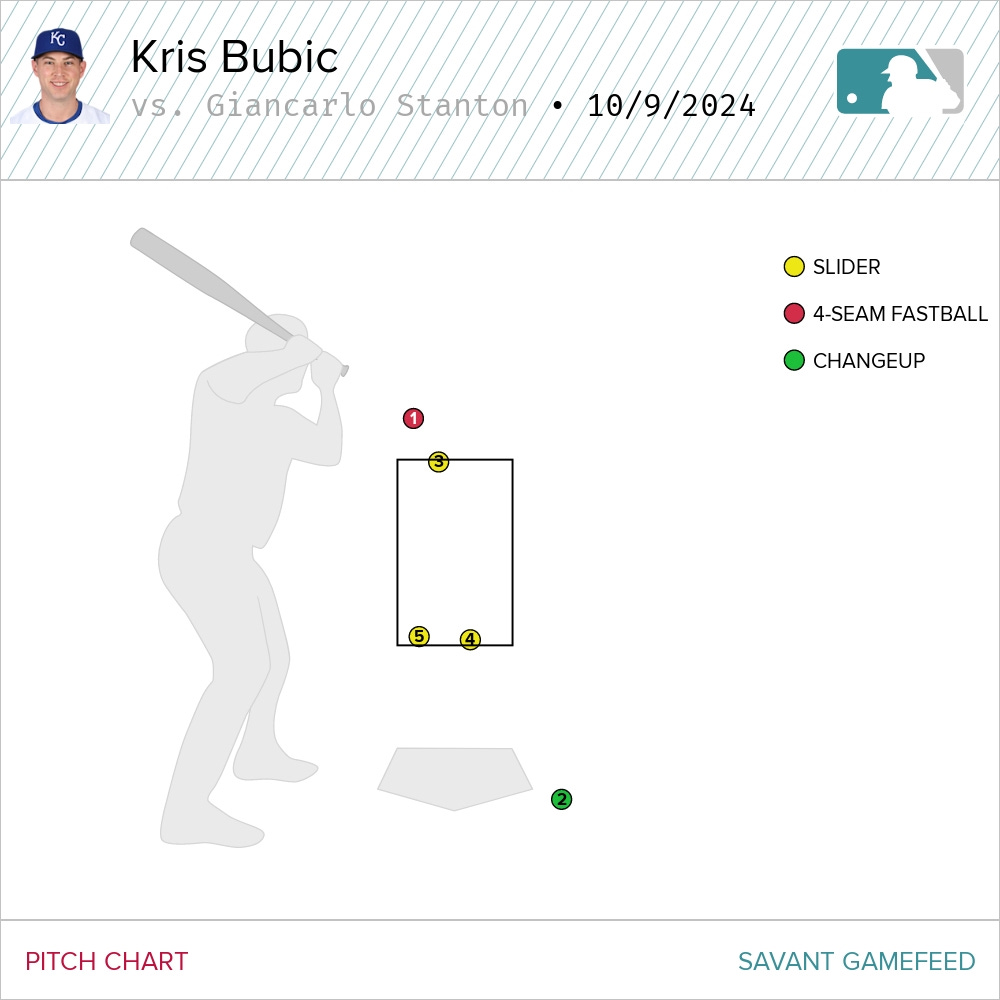

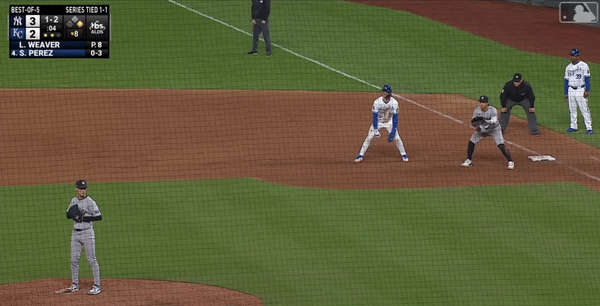

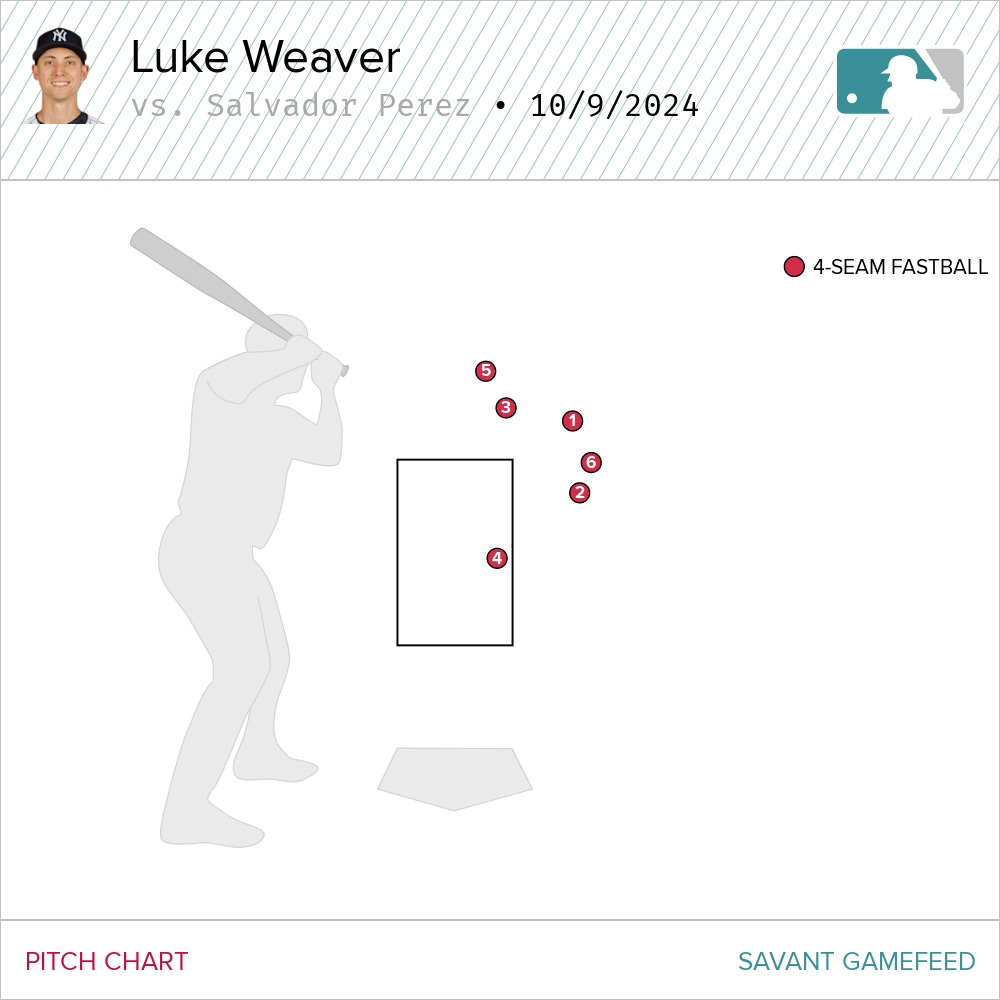









This series deserves better TV coverage and better umpiring.
I've been to some electric games at the K back in the 80s and 14-15, but this was my first in-person playoff experience, and except for the final score, it did not disappoint. And when the Royals rallied in the 5th, man, that was intense. I'm definitely hoarse this morning.
As for the rest of the series, it's still right there for them. Walks have hurt them, but the extra baserunners haven't killed them like I feared they would in this series. Who knows how it will play out? That's the beautiful and frustrating thing about sports. It could be a matter of whose superstars bust out first, though I have a gut feeling it will come down to who gets the superior starting pitching performance. Cole is capable of ending it tonight, but Wacha and Ragans are equally capable of dealing up a KC upset. As long as Chisolm isn't the hero. I had no problem with the guy until Monday night, but I think we'd all like to see him walking off the field with a dejected look on his face Saturday.
But you're right, playoff baseball, while one of the greatest things in the world, is stressful as hell.